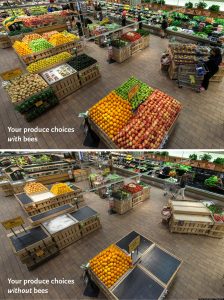How will Brexit affect bees in the UK? Interview with Marcus Cordingley

20th of June, 2016
Following Brexit a lot of environmentalists have been questioning the effects of leaving the EU. Bees are threaten all over the world by different things such as pesticides and climate change. The EU with its policy against some pesticides for example, has been a protection for bees and bee keepers all over the Union.
It is difficult to realise the impact bees have in our lives. We know that they pollenize a great number of plants and flowers and that they are an essential element to renew crops, however it is hard to realise if bees were to become extinct humans would have to do the important jobs they do for us considering how important they are to our livelihood in areas such as agriculture. The most pessimist thinkers say that humanity would only last for 3 years if bees were to disappear.
In England the bee population has declined by a third since 2007, this situation is likely to get worst due to Brexit and number of environmentalists are concerned about the impact the exit from the EU will have on the bee situation.
“I think the environmental impact on bees is something that could be quite important as there were good environmental safeguards while we were part of the single market -think neonicotinoids or genetically modified crops.” Marcus Cordingley
Marcus Cordingley has been a beekeeper all his life. Currently keeping 150 hives, he agreed to answer our questions.
– How is the bee population? We often hear that pesticide greatly damage this species and they are being used more often, did you notice a change within your bees within those last years?
The bees seem quite healthy at the moment with little sign of varroa. The weather is the most challenging thing as this year the winds come from the east and the west and they are on the chilly side so I hope Brexit doesn’t mean more of these as I want my weather to come from Europe!
– Do you think that the European Union policy protected bee population in the UK?
I think Europe’s message on the environment was a protection against pesticides and GM crops so the future here is not rosy.
– What kind of changes are you expecting from Brexit?
Costs associated with setting up a beefarm will rise as everything you need is made in Europe or the USA including queens (oddly enough!). Sugar being internationally traded will also go up which is the main substitute for honey as a beefeed. Of course the British economy might become so high performing that the pound might become a fashionable currency for haven seekers like the Swiss mark or the yen or dollar but I didn’t buy that argument when deciding to vote in or out. Having spoken to one beekeeper in my association of producers (Bee Farmers Association) most members voted remain. With regards to honey well obviously the weak pound will be good for English honey prices as imported honey increases in price so the premium of the English honey should also increase in line. But as there will be higher prices all round it s not going to mean life in the fast lane for British beekeepers.
[x_author title=”About the Author”]








